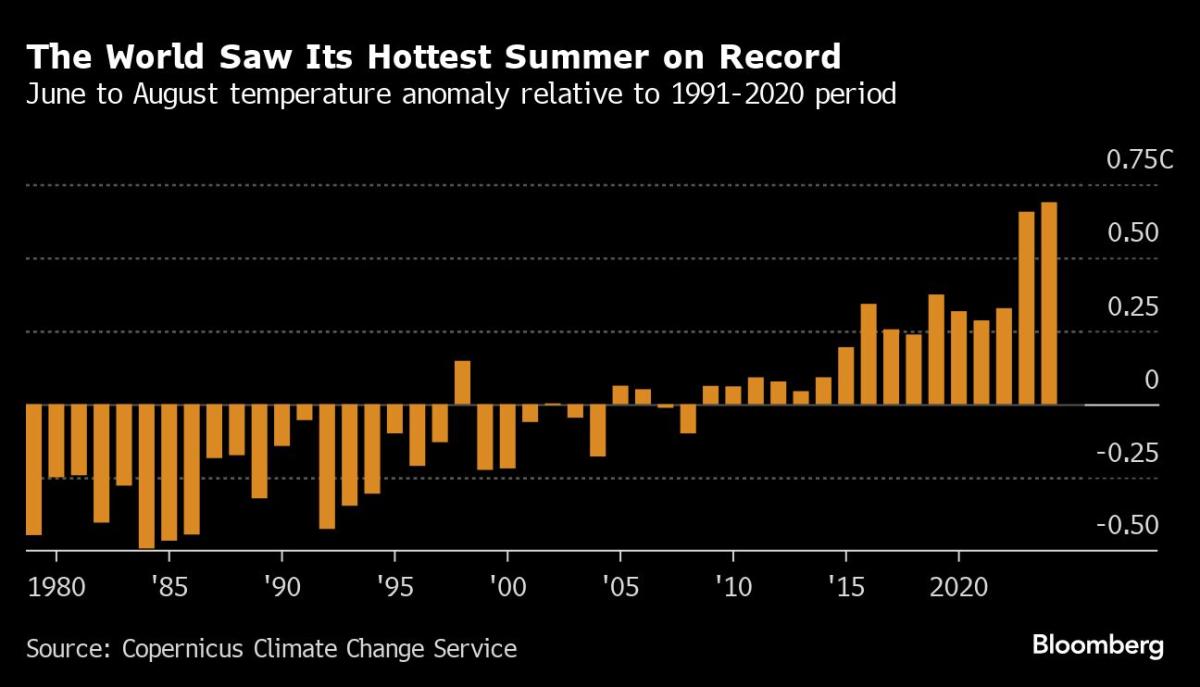


(Bloomberg) — Bullion’s record-setting ways are giving investors, analysts and industry experts plenty to talk about as Denver Gold Group’s 36th annual forum gets underway in Colorado. The premium for gasoline and diesel futures over crude oil is falling in a bearish sign for US refiners. And the dying days of summer in the Northern Hemisphere brings an end to record warmth across the globe that added challenges for commodities.
Most Read from Bloomberg
Here are five notable charts to consider in global commodity markets as the week gets underway.
Gold
Gold’s surge to repeated record highs should fuel lots of chatter at Denver Gold’s gathering in Colorado Springs, including how it’s helping those who dig the precious metal out of the ground. Bullion has risen 25% this year, repeatedly setting new all-time highs along the way while boosting investor enthusiasm for gold miners. A Bloomberg Intelligence index of top producers including Newmont Corp., Barrick Gold Corp. and Agnico Eagle Mines Ltd. has outperformed gold’s advance, rising more than 30% this year.
Oil
The premium of gasoline and diesel futures over West Texas Intermediate crude — better known in industry jargon as the 3-2-1 crack spread — sank last week to the lowest since February 2021. Oil consumption growth is the slowest since the Covid pandemic as the Chinese economy cools, according to the International Energy Agency. In the US, softer economic data is further stoking concern when demand is already seasonally slower and East Coast gasoline inventories have risen above the five-year average for the first time since 2021. The further narrowing of the crack spread — a proxy for the potential profit from turning a barrel of crude into fuels — would weigh on the outlook for oil refiners, potentially forcing some to reduce production rates to avoid a glut.
Wheat
Hot and dry weather has taken a toll on wheat crops, with top exporter Russia and key European producers such as Germany and France harvesting less than last year. Still, the world is expected to harvest about 797 million metric tons of wheat in the current crop year — the most ever, according to the latest data from the US Department of Agriculture. The big supplies are helping drive down prices of the grain — futures have fallen 5.3% this year — a welcome trend for cost-conscious millers and bakers.
Nuclear
Fund managers are betting that nuclear energy is set to make a comeback. An analysis by Robeco Institutional Asset Management already shows that nuclear energy is the top performer over three years among industry groupings of nearly 650 stocks seen as climate-solution providers. Adding nuclear to environmentally friendly portfolios is controversial, with skeptics citing concerns such as nuclear waste and supply of uranium. Still, proponents counter that running a nuclear reactor is emissions free.
Weather
The Northern Hemisphere’s summer is approaching an end, bringing a close to a record-setting period for global temperatures that underscores the impact of climate change on the planet. Global temperatures soared to 0.69C above historical averages from June through August, beating the previous all-time high set last year, according to the European Union’s Copernicus Climate Change Service. The shift is increasing the frequency and intensity of heat waves, triggering extreme weather events from droughts and wildfires to violent storms and flooding, bringing havoc to commodities markets.
–With assistance from Doug Alexander and David Marino.
Most Read from Bloomberg Businessweek
©2024 Bloomberg L.P.